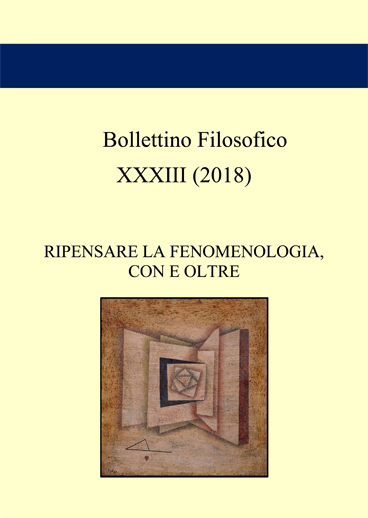Illusione ed errore. Il dogma dell’intuizione e le avventure fenomenologiche di Max Scheler
Abstract
This essay examines some of the main aspects of Max Scheler’s conception of phenomenology, starting from some of the early writings previous to the Formalismusbuch in which he analyzes the theme of self-deception and the idols of Self-Knowledge. Scheler, to whom Husserl’s transcendental phenomenology had no meaning, attacked the self-evidence of inner perception on a much larger scale. For him, inner perception, or more specifically self-perception, was as susceptible to illusion as external knowledge; in fact, Scheler thought it to be even more exposed to such risk. In an attempt to demonstrate this, Scheler went back to Bacon’s general doctrine of the idols with an investigation of the sources of illusions in the field of self-knowledge. In this essay I move from an analysis of the peculiar version of Scheler’s phenomenology and of its attitude – through which we enter into an immediate intuitive relationship with things, so that phenomenological facts or “whatness” are always fully given and are now beyond the range of all possible illusions, in order to contrast it with the Husserlian doctrine of perceptual illusion, developed in the context of the genealogy of logic and with reference to the theme of transcendent perception and of antepredicative experience.
Downloads
Bollettino Filosofico pubblica in internet, ad accesso aperto, con licenza:
|
|
CCPL Creative Commons Attribution |
L'autore conserva il copyright sul suo contributo, consentendo tuttavia a chiunque "di riprodurre, distribuire, comunicare al pubblico, esporre in pubblico, rappresentare, eseguire e recitare l'opera", purché siano correttamente citati l'autore e il titolo della rivista. L’autore, al momento della proposta di pubblicazione, è inoltre tenuto a dichiarare che il contenuto e l’organizzazione dell’opera è originale e non compromette in alcun modo i diritti di terzi, né gli obblighi connessi alla salvaguardia di diritti morali ed economici di altri autori o di altri aventi diritto, sia per testi, immagini, foto, tabelle, sia per altre parti di cui il contributo può essere composto. L’autore dichiara altresì di essere a conoscenza delle sanzioni previste dal codice penale e dalle leggi speciali per l’ipotesi di falsità in atti ed uso di atti falsi, e che pertanto Bollettino Filosofico è esente da qualsiasi responsabilità di qualsivoglia natura, civile, amministrativa o penale, e sarà dall'autore tenuta indenne da qualsiasi richiesta o rivendicazione da parte di terzi.
